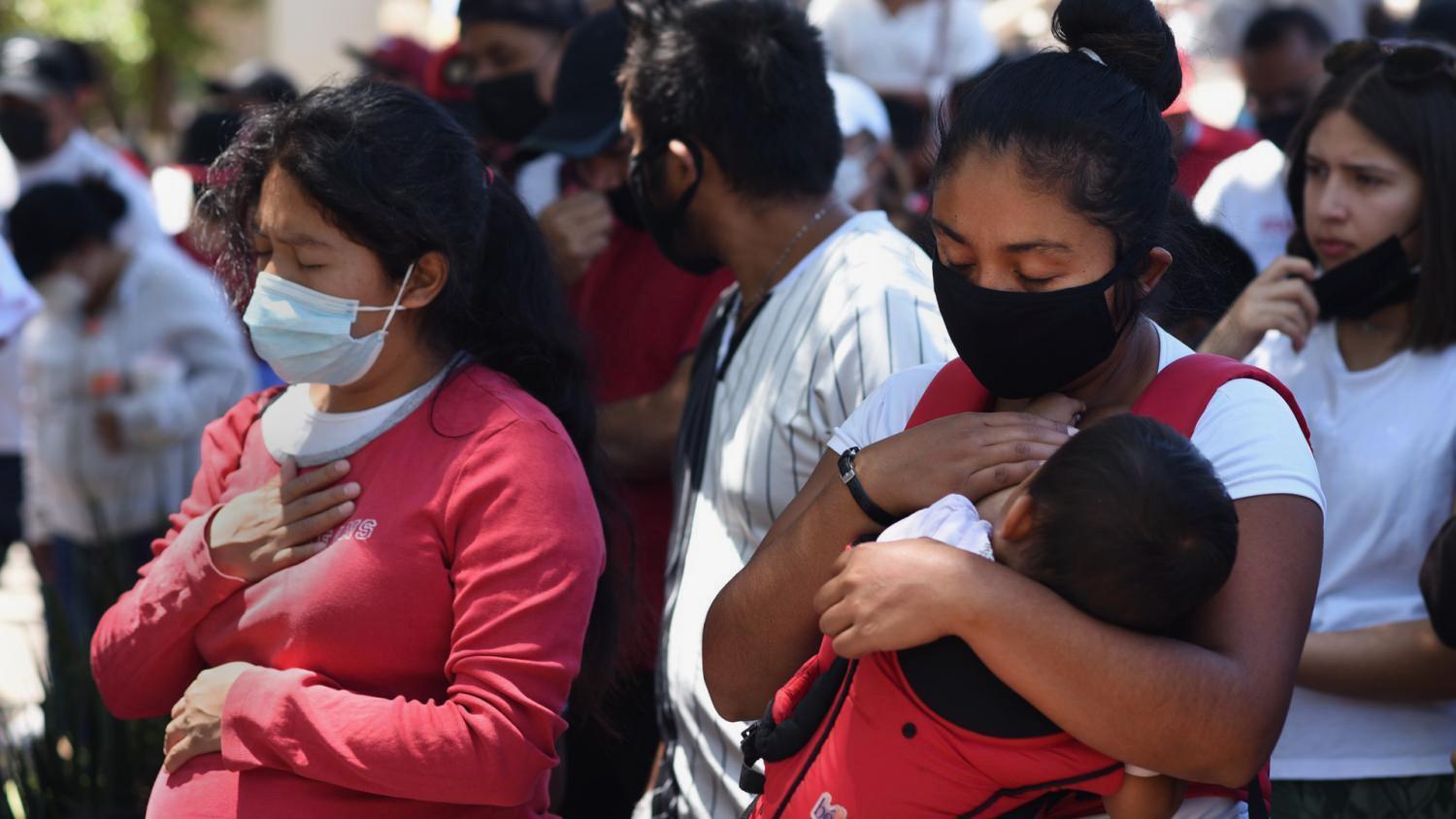‘That news hit us like a bomb’: Asylum-seekers still in limbo after ruling to keep Title 42 intact
Last Monday morning, some 400 asylum-seekers gathered around a megaphone in a little plaza shaded by old trees in the northern Mexican city of Nogales, Sonora, just across the street from the border crossing into the US.
Migrants trying to begin the asylum process in the US have marched, prayed and protested in events like these ever since the Trump administration enacted Title 42 at the border. The pandemic-era protocol allows immigration officers to quickly turn away migrants and asylum-seekers because of COVID-19.
Related: For immigrants fleeing gender-based violence, it’s a long road to asylum in the US
On April 1, when the Centers for Disease Control and Prevention announced that Title 42 would end May 23, it was the change that many migrants in Nogales had been hoping for. The rally was supposed to be a celebration.

“We had the news that this was going to end precisely today. We had that illusion, and we were happy because it was finally ending after so much time.”
“We had the news that this was going to end precisely today,” said Jesse, an asylum-seeker who helped organize the event. Her full name isn’t being used because she received threats back home and worries about her safety. “We had that illusion, and we were happy because it was finally ending after so much time.”
Then, in a highly anticipated decision handed down just days before, a court in Louisiana ruled the health statute would have to stay in place.
Last Friday, Judge Robert Summerhays ruled the CDC couldn’t end Title 42 without measures such as a public comment period or cost considerations. The policy was enacted under the Trump administration without either step. In Summerhays’ 40-page decision, the word “COVID” appears just nine times.
The Department of Justice said it plans to appeal, but proceedings are expected to take months.
Related: This Haitian schoolteacher helps new arrivals from Haiti resettle in Arizona
“That news hit us like a bomb,” Jesse said. “It was very, very difficult for us, the powerlessness.”
Jesse brought her five kids here almost a year ago after fleeing violence in southern Mexico. She said that she didn’t participate in any political movements or marches before this.
But coming here and being blocked from accessing asylum at the Nogales crossing, she began working with other mothers who were going through the same thing.
Still, she said, seeing all of the families gathered here motivates her to keep fighting for their rights. She clutched a clipboard with handwritten song lyrics and a testimony that she read to the crowd.
She said that she wants people to understand that migrants in Nogales are vaccinated and tested for COVID-19 before entering the US — they’re not a threat in terms of the coronavirus.

‘I don’t have any option but to wait’
Joanna Williams, with the Nogales-based advocacy group and migrant shelter Kino Border Initiative, said the situation at the US southern border is more complicated now.
“Not only did we have hopes that weren’t realized, but also [Title 42] becomes indefinite. This isn’t a matter of a 30-day extension of Title 42 — this is, ‘Well, [it goes on] until we figure out what the federal court system is going to do.’”
“Not only did we have hopes that weren’t realized, but also [Title 42] becomes indefinite,” she said. “This isn’t a matter of a 30-day extension of Title 42 — this is, ‘Well, [it goes on] until we figure out what the federal court system is going to do.’”
Related: Russians and Ukrainians attempt to flee to the US through Mexico
In the meantime, Williams said she worries migrants here will get desperate waiting, with no end in sight, often unable to access school for their kids or get health care. She thinks more people might try to cross into the US through the desert.
Jodel, another asylum-seeker from Haiti, whose full name also isn’t being used for safety reasons, and who was also at the protest, said that he knows people who have died that way. Others never made it here.
“They left their countries because of the violence, but they encountered more violence on the road, too,” he said.
He knows what that’s like. He and his wife left Haiti for Chile a few years ago after his parents were both killed in gang violence there.

They had a daughter in Chile. She was barely 2 when they left for Mexico. Jodel said that his family sticks out as migrants and have dealt with racism. He said that they have been targeted by organized crime, and they’re vulnerable waiting here at the border.
“For immigrants [in Mexico], it’s much worse, but for people of color, it’s much, much worse,” he said.
Related: Pressure mounts for Biden to end Trump-era Title 42 that shuts out migrants seeking asylum
They’ve been to different Mexican cities and bounced around the border over the last nine months. He said life is just standing still. When she’s old enough, his daughter won’t be able to go to school in Nogales, and he and his wife don’t have permits to work. But, he said that they’re not leaving.
“I don’t have any option but to wait,” he said. “We can’t cross the river, and we can’t cross the desert, either.”
He said both options are too dangerous. That’s why they’re trying to ask for asylum here, at the border crossing. So, Jodel said, they’ll wait. He just doesn’t know how long it will take.
An earlier version of this story was published by Fronteras.
